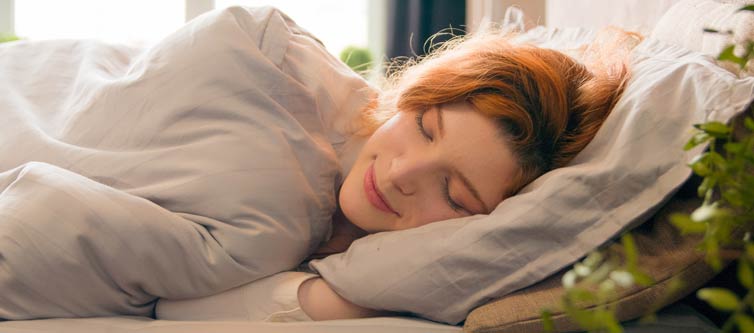
 |
|
||||||||||||
 |
 |
 |
 |
|||
How Sleep Impacts Our Physical and Mental Health |
 |
How Sleep Impacts Our Physical and Mental Health |
We often hear that sleep plays an important role in maintaining our health and well-being. That’s because how you feel when you’re awake depends in large part on how well you sleep. When you’re asleep, your body works to support healthy brain function and maintain your physical health. In children and teens, sleep also helps support growth and development. “Although sleep needs vary from person to person, most adults require seven-to-nine hours of sleep every night,” explains Hayley Flott, PDRMA Wellness Consultant. “Unfortunately, one-in-three adults in the United States don’t get enough sleep.” Getting quality sleep is not just about how many hours you sleep but how well you sleep. Signs of poor sleep include having trouble falling asleep, repeatedly waking up and feeling sleepy or tired even after getting seven-to-nine hours of sleep. If you have these symptoms, mention them to your doctor, because they may indicate a sleep disorder that prevents you from getting quality sleep. Common sleep disorders include insomnia, restless legs syndrome, narcolepsy and sleep apnea, a disorder in which breathing repeatedly stops and starts. Your doctor can help you diagnose, treat and manage these disorders. “Quality sleep is just as important to your health as eating a balanced, nutritious diet and exercising,” adds Flott. “Getting enough sleep can help you get sick less often, decrease stress and improve your mood. It also helps reduce the risk of developing chronic (long-term) conditions such as Type 2 diabetes, heart disease and high blood pressure. Sleep even affects your weight! Not getting enough sleep increases hunger and sugar cravings and stimulates the production of ghrelin, a hormone that increases our appetite.”
“Contrary to what you might think, alcohol does not help you sleep better,” notes Flott. “Instead, it leads to frequent wakings and low-quality sleep, and long-term use can create chronic sleep problems.” If you’re struggling to get a good night's sleep, try developing these habits:
|
 Over time, not getting enough sleep can have a negative impact on how well you think, react, work, learn and get along with others. One reason for this is that lack of sleep can change certain parts of your brain, making decision-making and problem solving more challenging. For example, people who sleep less than seven hours are more likely to be involved in motor vehicle accidents and to suffer related injuries or death. Additionally, lack of sleep can hamper creativity and connects to mental health conditions such as anxiety, depression and engaging in risky behaviors, including suicidality.
Over time, not getting enough sleep can have a negative impact on how well you think, react, work, learn and get along with others. One reason for this is that lack of sleep can change certain parts of your brain, making decision-making and problem solving more challenging. For example, people who sleep less than seven hours are more likely to be involved in motor vehicle accidents and to suffer related injuries or death. Additionally, lack of sleep can hamper creativity and connects to mental health conditions such as anxiety, depression and engaging in risky behaviors, including suicidality.